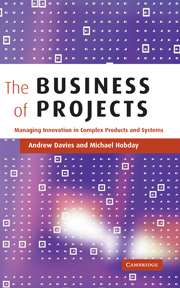Book contents
- Frontmatter
- Contents
- List of figures
- List of tables
- Foreword
- Acknowledgements
- Glossary
- 1 Introduction
- 2 The dynamics of innovation in complex products and systems
- 3 Business strategy and project capability
- 4 Systems integration and competitive advantage
- 5 The project-based organisation
- 6 Managing software-intensive projects
- 7 Learning in the project business
- 8 Integrated solutions for customers
- 9 Lessons for the project business
- Appendix A
- Appendix B
- Appendix C
- References
- Index
Appendix B
Published online by Cambridge University Press: 22 September 2009
- Frontmatter
- Contents
- List of figures
- List of tables
- Foreword
- Acknowledgements
- Glossary
- 1 Introduction
- 2 The dynamics of innovation in complex products and systems
- 3 Business strategy and project capability
- 4 Systems integration and competitive advantage
- 5 The project-based organisation
- 6 Managing software-intensive projects
- 7 Learning in the project business
- 8 Integrated solutions for customers
- 9 Lessons for the project business
- Appendix A
- Appendix B
- Appendix C
- References
- Index
Summary
Applying organisation development techniques to software processes
Our approach is based on intervention techniques from the field of organisation development, which tries to improve the way organisations work in practice. The tradition of organisation development, which spans both management strategy (Mintzberg, 1989) and implementation (Mullins, 1994; Handy, 1993; French and Bell, 1973; Tyson and Jackson, 1992), tends to treat strategy, management and work as iterative processes which are ‘crafted’, informal and sensitive to organisational style and human motivation rather than top-down, scientific or rational. These authors show how selective outside interventions can sometimes be helpful in surfacing issues, identifying problems and stimulating new working practices in firms (French and Bell, 1973). Underpinning this approach is the belief that dealing with soft, informal, human processes is essential to organisational improvement.
The method, described in detail in Hobday and Brady (2000), involved five basic steps, each with more detailed subprocesses and outputs (see Figure B.1). In Step 1 we agreed with management and practitioners the scope, aims, outputs and timing of the exercise, and identified a structured group of interviewees. In Step 2 we collected data on rational processes as contained in toolkits, manuals, flow charts, formal procedures – and from interviews with senior managers on how the process ‘should’ proceed. Process analysts at Dynamics contributed to the questionnaire design and to capturing, diagrammatically, the formal company processes.
Data were then gathered from practitioners on how the process actually proceeded in project Triumph, using a structured questionnaire.
- Type
- Chapter
- Information
- The Business of ProjectsManaging Innovation in Complex Products and Systems, pp. 274 - 276Publisher: Cambridge University PressPrint publication year: 2005

